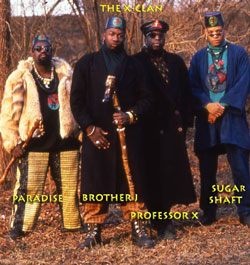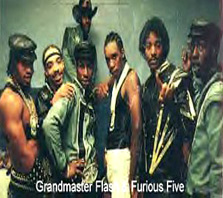 People have often talked about fighting wars using biological and chemical weapons. We came after Hitler for using them. We came after Saddam Hussein for using them. Sadly no one ever came after those who flooded urban communities during the 1980s and into the 90s with Crack. If this wasn’t a weapon of mass destruction, I don’t know what was.. One thing I can say about Hip Hop is that early on it confronted the problem.. Kool Moe Dee dropped a dope song called ‘Monster Crack’ in 1986..
People have often talked about fighting wars using biological and chemical weapons. We came after Hitler for using them. We came after Saddam Hussein for using them. Sadly no one ever came after those who flooded urban communities during the 1980s and into the 90s with Crack. If this wasn’t a weapon of mass destruction, I don’t know what was.. One thing I can say about Hip Hop is that early on it confronted the problem.. Kool Moe Dee dropped a dope song called ‘Monster Crack’ in 1986..
Before him, we heard Cracked Out by Masters of Ceremony featuring a young Grand Puba who later went on to be a part of Brand Nubian.. Of course we all know the joint from Public Enemy ‘Night of the Living Bassheads which featured the debut of a young actor named Samuel Jackson.
Another landmark song ‘Batterram‘ came from West Coast Legend Toddy Tee.. who responded to the hateful orders of LA Police Chief Darryl Gates to use an armored tank with battering ram to break into fortified crack houses in hood. On more than one occasions, police got the wrong address and broke down the wrong house..
We also cannot forget Donald D who was one of the first rap artists to come out and blame the FBI for crack in the Hood. This Rhyme Syndicate member had a song called F.B.I. which stood for Free Base Institute. Before people got into crack, they free based cocaine..
A west coast anthem addressing this scourge was Dope Man by NWA..which gave keen insight into what was going on at the time.. http://www.youtube.com/watch?v=WqECIKQaPBk Bay Area pioneer Too Short’s ‘Girl’ was another early joint http://www.youtube.com/watch?v=ImviIbqI-8Q
 In the same vein an anthem song that addressed cocaine and not crack was White Lines by Grandmaster Flash and Furuious Five. It was supposed to be an anti-drug song, but unfortunately many took it to be an endorsement of the popular drug.
In the same vein an anthem song that addressed cocaine and not crack was White Lines by Grandmaster Flash and Furuious Five. It was supposed to be an anti-drug song, but unfortunately many took it to be an endorsement of the popular drug.
Sadly one of the first crack songs I ever heard was one that actually came across as one that advocated smoking crack at least in the hook..It was called Crack it Up by Funkmaster Wiz. In the song Wiz says warns we better not crack it up, and in hindsight 20 years later we clearly hear it.. At the time..this song was an all out anthem that suggested we go for it.. For many its hard to believe Hip Hop went there, but let’s be honest, back in the early pioneering days it wasn’t unusual to hear popular artist of the day shout to high school folks, ‘If you snort cocaine- say yeah”
The song that really stood out for me but was definitely underplayed was this posse cut, done in the same spirit of ‘Stop the Violence’ and ‘We’re All in the Same Gang’. This was done by X-Clan leader Professor X. It was a 1993 joint called ‘Close the Crackhouse’ and featured an Allstar line up of Professor X, BrotherJ, Wise Intelligent, Big Daddy Kane, Digital Underground, Ex-Girlfriend, Chuck D, Sister Souljah, Mickey Jarret, Freedom Williams from C&C Music Factory and 2 Kings and a Cypher.
http://www.youtube.com/watch?v=EfWmc79iIHk
Kool Moe Dee ‘Monster Crack’
http://www.youtube.com/watch?v=d6ek6UXQWWU
Public Enemy ‘Night of the Living Bassheads’.. This video is deep on so many levels..especially how they showed just how widespread the problem was.. from Wall Street to the Hood. I also like how they did this video as a news report..
http://www.youtube.com/watch?v=fyR09SP9qdA
Donald D ‘FBI’
Toddy Tee ‘Batterram’
Funkmaster Wiz ‘Crack It Up’… Can you believe there was a song that actually advocated for crack? When this song first came out the chorus was an affirmative ‘Crack It Up’.. Funkmaster Wiz claimed it was anti-crack song, but the hook left everyone believing it was a pro crack song.. People complained and Funkmaster Wiz went back in the studio and tried to clean up the song by putting the phrase ‘Ya better Not’.. Over the past year or so, the original version has been scrubbed from Youtube and whats left is the anti-crack version..
http://www.youtube.com/watch?v=RVBD6hRepIw
Here is a excerpt of the original version.. You can see how folks concluded it was a pro-crack song..
Mele-Mel– doing a live performance of White Lines..
Masters of Ceremony ‘Cracked Out’
http://www.youtube.com/watch?v=62T0Njv-xjM
Return to Davey D’s Hip Hop Corner
Podcast: Play in new window | Download

 The hip-hop community has been hit with devastating losses over the past few months.
The hip-hop community has been hit with devastating losses over the past few months.
